All Americans and much of the world were awaiting President Donald Trump’s address on "the State of the Union," just one year into his presidency. Presidents use the State of the Union to try to heal the partisan divisions in the country, toreport on or take credit for their public policy accomplishments, propose new initiatives for the coming year, cast blame on opponents or adversaries for failures, communicate priorities to public servants looking for leadership, and praise the American people for their values, commitment, courage and patriotism.
No one knew what Trump would say, perhaps not even Trump. At times Trump’s speeches are shared with the media in advance only to have him go "off script" and say the opposite. Sometimes Trump goes off on tangents, departing from his prepared remarks he is to read from a teleprompter. At other times, Trump gives great speeches.
Consider past major speeches. Trump gave the most "negative" divisive Inauguration Speech in history when he was sworn into office before the nation on January 20, 2017.
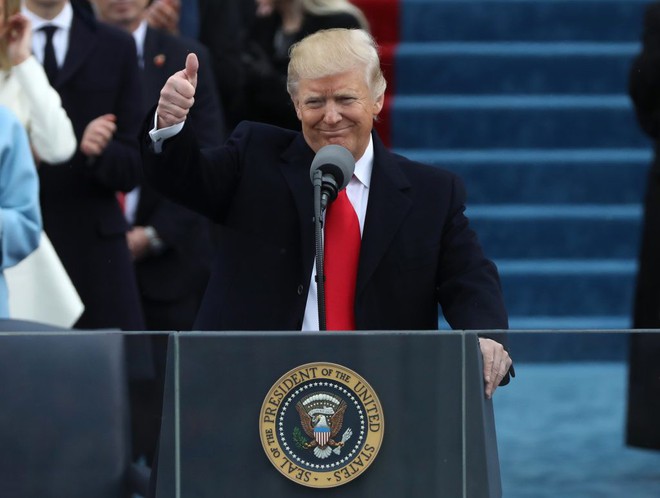
President Donald Trump gives a thumbs up after being sworn in as the 45th president of the United States on the West front of the U.S. Capitol in Washington, U.S., January 20, 2017. Photo by REUTERS/Carlos Barria
Trump addressed APEC nations in Vietnam in November 2017 in a speech clearly explaining the implications of his "America First" for Asia Pacific nations looking to trade with the US and cooperation on security, an effort presenting a stark contrast with China’s approach.Last week Trump faced a hostile crowd in Davos, Switzerland, at the World Economic Forum. But, Trump emerged victorious: many of the world’s richest business and government leaders widely praised Trump’s recent tax cuts, business deregulation policies and invitation to invest in the US.
I’m writing this commentary as Trump finished his speech. Now we have answers to the questions posed above.
This was perhaps the best major address yet delivered by Trump, even though his detractors won’t agree. He took credit for his many accomplishments in his first year in office, he "called out" Americans who were disrespecting their country, reported how he was repairing some of the past errors of previous administrations, put some countries on notice, and repeatedly praised the American people. His speech will also be remembered for what he did not mention. His opponents will find little that they can agree on or support.

Trump took credit for the burgeoning US economy. The administration has very low unemployment rates, a record high stock market that has added $8 trillion in wealth over the past year, a strong GDP, rising wages, record high tax collection, and government deregulation. Trump made it clear that this was a main theme for his presidency: "This is our new American moment." Critics, of course, claim that this was all in place under Obama and that Trump uses false data, but Trump disagreed in his speech.
Trump called out recent protests involving criticism of the police in events associated with the American flag. Athletes on some professional sports teams have publicly kneeled during the playing of the national anthem at the start of a game. The protests wished to call attention to police shooting of minorities. Trump chastised the athletes for denigrating the flag and the millions of Americans who have died defending it.
Trump condemned North Korea for its nuclear weapons threat to extort concessions from the US and its allies. He especially mentioned the arrest of an American student in North Korea who was returned to the US in such bad shape and died a few days later. He pointed to the sanctioning of Cuba and Venezuela for the authoritarian practices. And, Trump supported peace protests in Iran and again called on Congress to redo the nuclear weapons treaty.
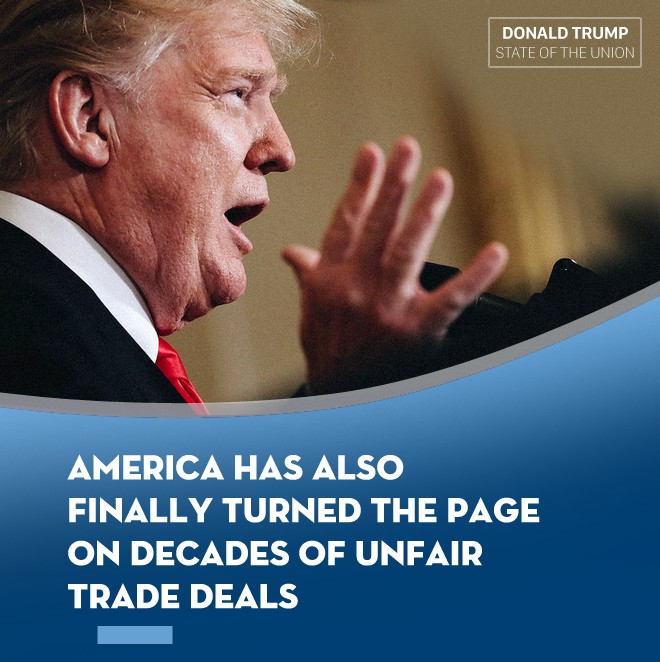
Trump’s main policy initiative concerned immigration policies. He tried to make it a bipartisan approach reaching out to opposition Democrats and some Republicans. The policies were so different from the increasingly left-leaning Democrats that they will never support them. Trump offered to give 2 million illegal immigrates a path to citizenship in exchange for immigration reforms including: a merit based system giving priority to those who can contribute to the country, rather than become dependent on welfare; an end to chain immigration, the idea that once an immigrant arrives in the US they can bring in numerous relatives as well; and termination of the visa lottery, a policy that allows immigrants to the US at random. And, most importantly, the funding of a multi-billion dollar wall across the southern US-Mexico border.
Paid Family Leave was a policy aspiration as was a new emphasis on vocational education programs for young people. Both would be popular.
Trump proposed a multi-billion dollar infrastructure plan aimed at improving highways, airports, energy systems and the like. This will likely not succeed as Trump wants to pay for the projects through public-private partnerships costing $1.5 trillion.
The last major policy initiative was to substantially increase military spending well beyond the Obama years. Trump called for a removal of funding caps limiting how much could be spent on defense. Nuclear weapons would be upgraded to pose a major deterrent to threats against the US.
It’s interesting to see what Trump left out of his speech. He made no mention of China and Russia, perhaps the most significant foreign policy issues facing the US. He did not refer to the Asia Pacific region or the tensions in the East Sea. Europe was absent from the speech. On trade, he only repeated that he wants trade deals that are mutually beneficial, but he gave no specifics. Trump also did not mention climate change or energy policy.

Congressional members and presidents highlight their policy priorities by bringing guests to the State of the Union speech. President Ronald Reagan began the tradition in 1982. The mass media inevitably covers the guests and makes comments about them—essentially free advertising for those running for elected office. Trump took the patriotic road, while opponents appeared to be disgruntled and disaffected.
Many congressional Democrat members brought guests to the Trump speech in protest. Sexual assault victims, people affected by the hurricane in Puerto Rico, and a transgender soldier to name a few. At least 28 immigrants—illegal or related to illegals—attended, reflecting the Democrat party highest policy priority of legalizing illegals. To counter Democrats, Trump invited two families whose children were murdered by illegals who were gang members.
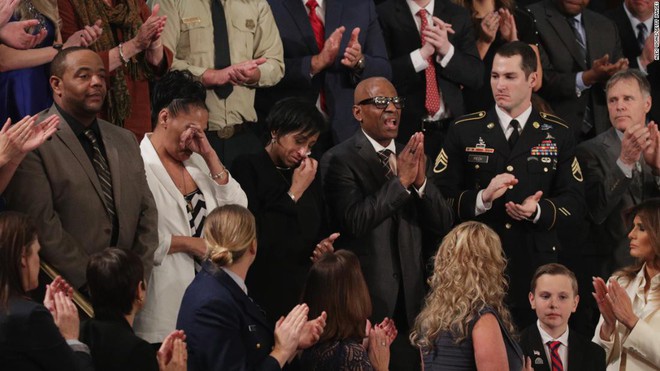
President Trump honors parents of teen girls slain by MS-13 gang. Photo: Getty
Democrat Senator Richard Blumenthal brought a guest, a survivor of child sex trafficking. The Senator is famous for lying that he served in Vietnam during the American War, yet he sought deferments to stay out of the military over a five year period, and then spent the war working on charity projects in Washington, DC.
By contrast, Trump hosted wounded soldiers, "first responders" to disasters, border patrol officers who have arrested gangs originating from Latin America, and business owners and taxpayers who have benefitted from Trump’s tax reforms.
Even Trump’s most vocal critics in the news media admitted that he used these guests vary effectively in supporting major points in his speech.

Trump opponents, the so-called "resistance," have been trying to cast a negative light on the speech even before it was delivered, also during and after. This includes the main stream media.
In the hours before the speech, the media assembled their usual panels of commentators. CNN, the most negative toward Trump spent most of their time talking about Trump’s issues with the investigations into Trump’s alleged collusion with the Russia government to win the presidency. They did not talk much about the speech.
Jimmy Kimmel, a late night ABC Television talk show host, interviewed Stormy Daniels, a pornography star, about a "relationship" she allegedly had with Trump not long ago. Kimmel was scheduled to air this live just after Trump’s speech. It is unclear whether Stormy’s appearance will be a minus or a plus effect on Trump supporters.
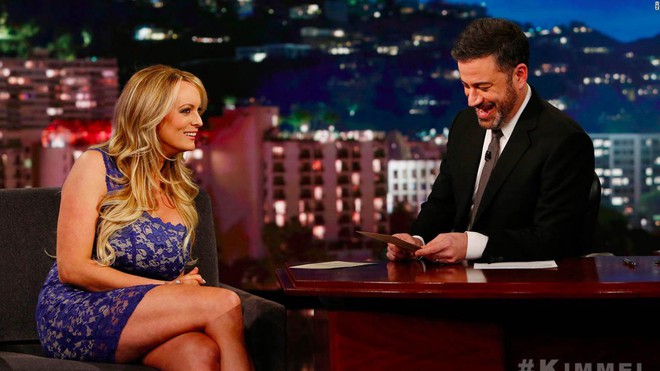
Stormy Daniels Appears on ‘Jimmy Kimmel Live!’ After State of the Union Address. Photo: ABC
A group of Hollywood celebrities held a "Peoples State of the Union" as a public alternative to Trump’s address. The event was planned for the day before the speech in New York City. The event was curious in that no one has ever heard of these celebrities and Trump’s speech was in Washington, not New York.
Democrat congresswoman Maxine Waters appeared on the Black Entertainment Television (BET) network calling for Trump’s impeachment. Maxine is an 80 year old who began calling for Trump’s impeachment even before he was elected to office. Maxine gained fame by announcing that she would not work with Trump under any conditions, also before he took office. Maxine was voted the most corrupt member of Congress by the Citizens for Responsibility and Ethics in Washington.
Democratic congresswomen wore all black to protest Trump generally. Six members of the Congressional Black Caucus, all Democrats, announced that they would not be attending the speech. Some announced that would walk out of the speech: No one did.
Supreme Court Justice Ruth Ginsburg has been travelling the country criticizing Trump and reporting she would not attend the speech. Ginsburg, 84 years old, is famous for falling into deep sleep on national TV during President Obama’s 2015 State of the Union address.
President Obama created a grassroots political arm of his presidential campaign—Organizing for Action—to help preserve his legacy after leaving office. They staged protests in 24 rallies in 8 states. Another 50 groups met at the National Press Club in Washington during the speech to protest Trump as a white supremacist, anti-woman and anti-labor, according to the Washington Times.

Trump will have great difficulty enacting his policy proposals.
The congressional Democrats will not support, nor have they supported in the past, anything Trump wants to do. Additionally, there are perhaps five Republican Senators who during the past year have tried to thwart Trump, often successfully. To Trump, these Republicans seem more like Democrats.
To complicate matters, the nation will hold mid-term elections in November, with campaigning already underway. Republicans in states that Trump carried in his presidential election in 2017 will do well to support Trump. But Republicans in competitive states could be in trouble. So, the Democrats could win the House and perhaps the Senate, depriving Trump of the majorities he needs to pass legislation in Congress.
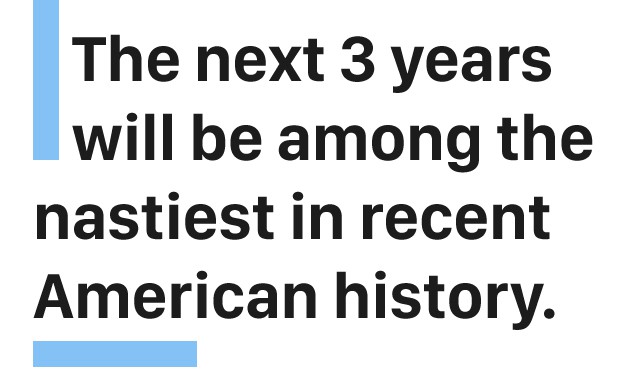
Congress, even with the election 10 months away, will be in gridlock primarily over immigration and defense spending. Democrats recently shutdown the government by holding up legislation to provide funding for its operation. They plan to do that again. The Democrats never support defense spending, and prefer to spend money on domestic programs, including immigration. Republicans tend to support defense spending. Someone in the Democrat Party recently leaked a memo stating that the Congress needs to pass immigration reforms to bring in as many illegals as possible because they vote Democratic in elections. Obviously, Republicans will resist this.
With President Obama no longer able to run, as many as 10 congressional Democrats are actively running for office, not in the November election, but for the 2020 presidential election. This means that the political system is fraught with misinformation, hyperbole, obstructionism, and opportunism. Billions of dollars are being raised and will be spent to influence the elections. The next three years will be among the nastiest in recent American history.
Democrats do not seem to support Trump no matter what, as evidenced in the speech. Democrats in only a few instances applauded for something Trump said. The Congressional Black Caucus, a group of Black congressional members, could not bring themselves to clap even as Trump reported that Black unemployment rates were the lowest in 45 years. To be fair, Republicans did the same thing in opposition to President Obama.
Of course, Trump has a history of messing up after making a great speech, or any speech. He is "his own worst enemy." He becomes fixated on minor issues that detract from his main messaging: criticizing Senator Elizabeth Warren for her lies about being a Native American, for example. Trump tends to make policy in "one-liners" published to Twitter. These quite often reverse the policies he proposes in his speeches: he supporters citizenship for 700,000 illegal immigrant children, referred to as "Dreamers" then later added another 1.2 million, making both Democrats and Republicans upset. Trump can’t resist offending people he opposes: in his speech he called on Congress to support his immigration reforms, then in the same breath, he stated, "Americans are dreamers too." Trump often avoids confrontation at times when he is expected to respond forcefully: his failure to address Russia and China raises doubts about what his intentions are.
If all of this weren’t enough, Trump faces several investigations in Congress and a special prosecutor investigation into his campaign activities involving Russian attempts to influence the Hillary Clinton-Trump election. Trump fired the FBI Director James Comey, an act leading to potential charges of obstruction of justice. These investigations began over a year ago and will continue into the future, probably heating up as the election approaches. Many of his staff have quit or been drawn into the investigations. Steve Bannon, a person largely responsible for pushing Trump into extreme nationalist positions, has spent the last few months undermining Trump, often effectively.
In addition to political scandals, Trump continues to be the subject of salacious stories on his personal ethics, particularly with respect to his treatment of women. Unfortunately for Trump, America is in the midst of a massive revolt among women who have experienced sexual assault or harassment. This has become a mass movement, and Trump is a major transgressor.
It has now been revealed that the Justice Department and FBI may have been actively working to interfere with Trump’s presidency from its start. Trump is heading a government that is working toward his failure: there really is a "deep state" in many parts of the government.
The persistence efforts by the main stream media will be a factor in Trump’s success. CNN, New York Times, Washington Post, and other major outlets publish mostly negative news about Trump. Much of it, but certainly not all, is well deserved. But a divisive as Trump is, it’s hard to believe that CNN and the other media can report negative news stories 90% of the time according to credible academic studies.
The amazing thing about Trump is not that he was able to accomplish a lot for the constituents who elected him, but that he was able to accomplish much at all given the circumstances swirling around him. Perhaps he will somehow succeed in his second year in office.
For Vietnamese version, click here .
Xem bài viết bằng tiếng Việt tại đây.
